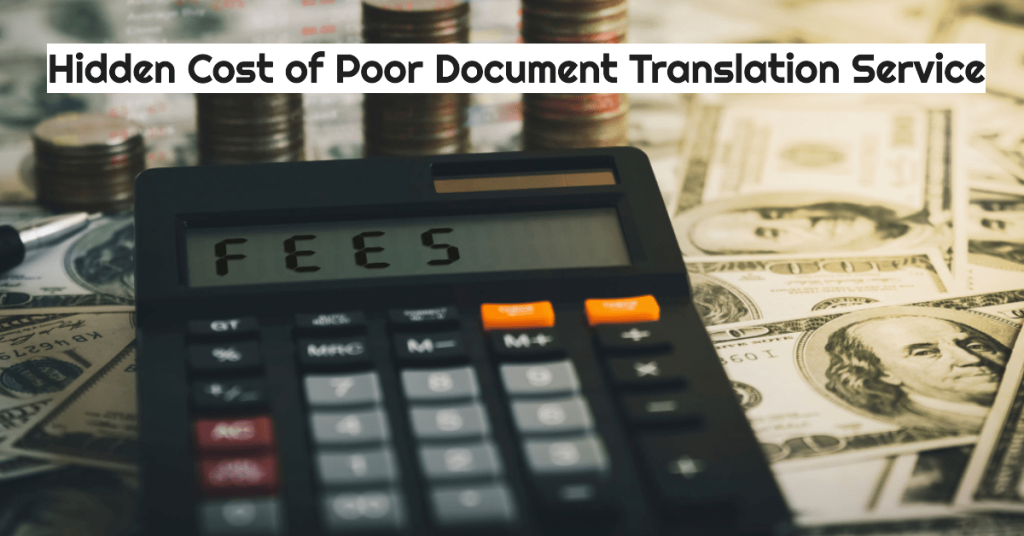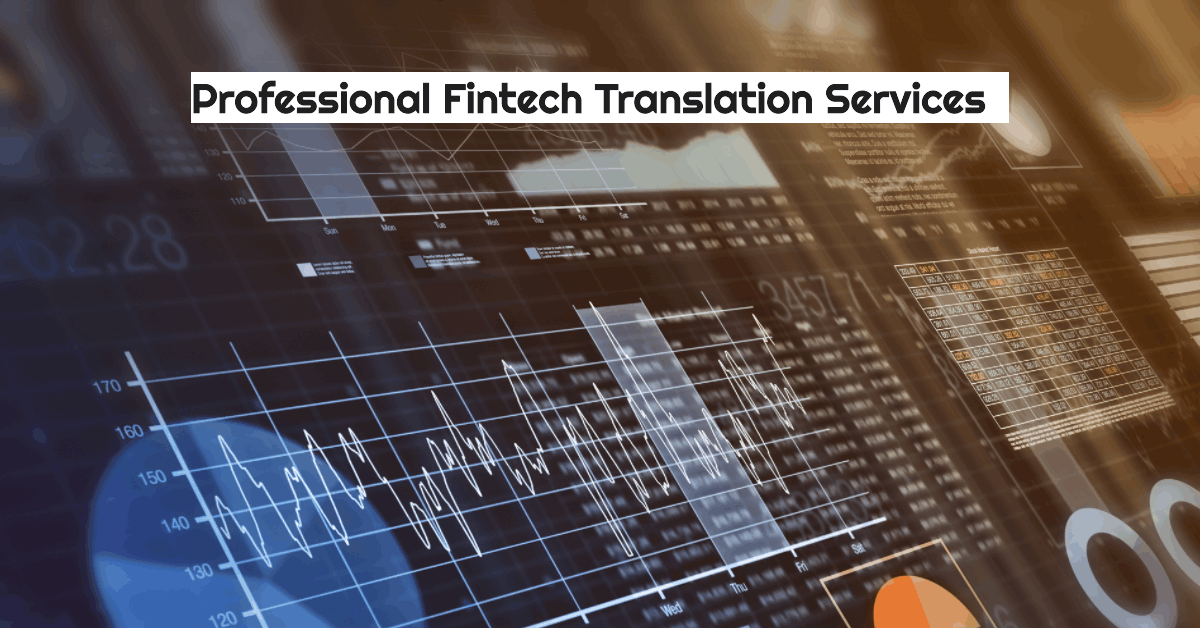Hidden Cost of Poor Document Translation
In the increasingly interconnected world of global commerce, the need for accurate and reliable document translation has never been more critical. Businesses of all sizes, from startups to multinational corporations, rely on effective communication to navigate international markets, build relationships, and maintain legal compliance.
However, many companies underestimate the significant financial, legal, and reputational risks associated with poor document translation.
While the upfront costs of professional translation services might seem like an expense, the hidden costs of subpar translations can far outweigh any initial savings, leading to unexpected and often devastating consequences.
This blog post aims to shed light on the often-overlooked expenses that arise from inadequate document translation, providing a comprehensive overview of the true price companies pay for inaccuracy.
By understanding these potential pitfalls, businesses can make informed decisions about their translation strategies and invest in high-quality translation to safeguard their interests and achieve global success.
This article is worth reading because it provides a thorough analysis of the hidden costs that businesses often overlook when dealing with poor document translation, and provides a clear guide on how to avoid these pitfalls, ultimately saving money and protecting the reputation of the business.
What is the Price of Poor Document Translation Service
The ramifications of poor document translation extend far beyond mere linguistic errors. They penetrate the core of a business’s operations, impacting its financial stability, legal standing, and reputation. The “true price” of inaccuracy is a multifaceted expense that companies often fail to fully comprehend until it’s too late.
Financial Losses
One of the most immediate and tangible consequences of poor translation is financial loss. This can manifest in various forms, from lost revenue to increased legal expenses. Consider, for example, the impact of mistranslated marketing and product descriptions. If a company’s product descriptions are poorly translated, potential customers may misunderstand the product’s features or benefits, leading to decreased sales. Similarly, a mistranslated marketing campaign may fail to resonate with the target audience, resulting in wasted resources and missed opportunities. The lost revenue from these miscommunications can be substantial, especially in competitive international markets.
Moreover, errors in legal contracts and agreements can lead to significant financial liabilities. Misinterpreted contract terms can result in breaches and penalties, while disputes arising from translation errors can lead to costly litigation. The expenses associated with fixing and redoing poor translations also contribute to financial losses. Companies may need to allocate significant time and resources to correct mistakes, potentially requiring them to hire additional translators or language experts. This not only adds to the direct costs of translation but also diverts resources from other critical business activities. Poor document translation can cause a company to translate a document multiple times, wasting resources and time.
Legal Consequences
Beyond financial losses, poor document translation can have severe legal repercussions. Inaccurate legal translations can lead to litigation, disputes, and even criminal charges. Errors in contracts, agreements, and other legal documents can result in misinterpretation of obligations, potentially leading to unintended legal commitments.
In court proceedings, inaccurately translated documents may be deemed inadmissible, weakening a company’s position in legal disputes. This can be particularly problematic in international legal battles, where the stakes are often high. For example, a mistranslated agreement may lead to a breach of contract, or a mistranslated legal document can cause a company to lose a court case.
Furthermore, complications in immigration processes and application denials are common consequences of poor translation. Errors in translated immigration documents can lead to application rejections, delays, and additional scrutiny. This can have significant implications for individuals and businesses seeking to relocate or expand internationally. In Singapore, for example, incorrect ICA translation can cause issues for those attempting visa or citizen applications.
In essence, the risk of litigation and legal complications due to poor document translation is a significant concern for any business operating in a global context.
Reputational Damage
The damage inflicted by poor document translation extends beyond financial and legal realms, profoundly impacting a company’s reputation and credibility. In today’s digital age, where information spreads rapidly, a single translation mistake can quickly go viral, eroding brand image and damaging trust.
Poor translations can make a company appear unprofessional or careless, leading clients and partners to question the overall quality of its products or services. Inaccurate translations can undermine confidence in a company’s competence, potentially leading to the loss of valuable business relationships.
Moreover, cultural insensitivities in translations can offend potential partners and strain existing business relationships. Misunderstandings arising from poor translation can create barriers to communication, hindering collaboration and damaging long-term partnerships. For example, a mistranslated marketing slogan that is offensive in the target language can cause significant damage to the brand.
The erosion of brand image and credibility due to poor translation can have lasting effects, making it difficult for a company to regain the trust of its clients and partners. In an era where online reviews and social media play a significant role in shaping public perception, the reputational damage caused by poor document translation can be particularly severe. It is vital to ensure that all translated documents are of a high quality to protect the company’s reputation.
Specific Areas of Concern for Poor Document Translation Services
The hidden costs of poor document translation manifest in various specific areas, each with its own set of challenges and potential consequences.
Legal and Compliance Risks
One of the most critical areas of concern is the risk of legal and compliance violations. Misinterpretation of contract terms, due to subtle changes in meaning during translation, can alter contractual obligations. This can lead to unintended commitments or liabilities, potentially resulting in costly legal disputes.
Furthermore, mistranslated compliance documents can result in violations of regulatory requirements, leading to fines or penalties. In some cases, non-compliance may even lead to business license suspensions, severely impacting a company’s operations.
Privacy breaches due to repeated handling of sensitive documents during the translation process are another significant concern. Confidential information may be exposed, violating data protection regulations like GDPR. It’s important to ensure a translation agency is compliant with all data protection regulation.
Business and Marketing Setbacks
Poor translation can also lead to significant business and marketing setbacks. Ineffective marketing campaigns in foreign markets are a common consequence. Slogans and messages may lose their impact or even become offensive when poorly translated. Cultural nuances may be lost, leading to disconnects with the target audience.
Misunderstandings arising from unclear product information can deter potential customers, leading to lost sales opportunities. Mistranslated pricing or terms can cause confusion and abandoned purchases. Moreover, delays in project completion and market entry are common when time is spent correcting translation errors. Miscommunication can cause delays in product launches or business initiatives, hindering international expansion.
Technical and Specialised Fields
In technical and specialised fields, the consequences of poor document translation can be particularly severe. Errors in medical translations can affect patient care, potentially leading to serious health risks. Incorrect dosage translations, for example, have resulted in fatal overdoses.
Similarly, misinterpretation of technical specifications in engineering documents can lead to product malfunctions or safety issues. Misunderstood specifications can result in costly manufacturing mistakes.
Inaccuracies in financial reports can lead to poor decision-making. Mistranslated financial terms can misrepresent a company’s financial position, potentially leading to misguided investment decisions or regulatory issues. In these fields, it is important to hire translators with industry specific expertise, to avoid jargon errors.
Importance of Quality in Translation Service
Given the significant risks associated with poor document translation, investing in high-quality translation services is not merely an expense but a strategic imperative.
Expertise Matters
In specialised fields like law, medicine, and finance, the value of subject matter experts in translation cannot be overstated. Industry-specific knowledge ensures accurate terminology use, allowing translators to navigate complex concepts with precision. Expertise in these fields is vital to ensure the accuracy of the translated documents.
Moreover, cultural understanding and localisation are essential for effective translation. Translators should not only be linguistically proficient but also culturally sensitive, adapting content to resonate with local cultures. Understanding cultural nuances helps avoid offensive or inappropriate translations, fostering positive relationships with international partners and clients.
Technology and Human Touch
While AI-assisted tools can improve efficiency in translation, the necessity of human oversight for context and nuance remains paramount. Translation memory systems can enhance consistency across documents, and machine translation can provide a starting point for human refinement. However, human translators can catch subtle meanings that machines might miss, ensuring that the translated documents accurately convey the intended message.
Cultural adaptation often requires human judgment and creativity. Translators must be able to adapt the content to suit the target audience, considering cultural sensitivities and local customs. The human touch is indispensable in ensuring that translations are not only accurate but also culturally appropriate and engaging.
Choosing the Right Translation Service Provider
Selecting a reputable and experienced translation service provider is crucial. Businesses should prioritise certified and experienced translators with proven expertise in their specific field. Look for translators with relevant industry certifications and a track record of delivering high-quality translations.
Evaluating quality control processes is also essential. Inquire about the service’s review and proofreading procedures. Check if they use multiple translators for cross-checking and if they employ native speaker reviewers.
Balancing cost with value and expertise is another critical consideration. While cost is a factor, businesses should understand that high-quality translations may require a higher investment. Consider the long-term benefits of accurate translations versus the short-term savings of subpar services.
Choose WhizWordz for Your Document Translation Service
The hidden costs of poor document translation are a stark reminder that in the global marketplace, linguistic accuracy and cultural sensitivity are not optional luxuries but essential investments. As we’ve explored, the ramifications of subpar translations extend far beyond mere linguistic errors, impacting financial stability, legal standing, and brand reputation. From lost revenue and legal disputes to damaged credibility and missed opportunities, the true price of inaccuracy can be devastating.
Investing in quality translation services is not an expense but a strategic imperative. By partnering with a reputable and experienced translation agency like WhizWordz, businesses can mitigate these risks and ensure that their communication is accurate, effective, and culturally resonant. We understand that professional translation is not just about converting words; it’s about conveying meaning, building trust, and fostering understanding across diverse cultures.
At WhizWordz, we are committed to providing top-notch translation services that empower businesses to thrive in the global arena. Our team of certified and experienced translators, with their subject matter expertise and cultural sensitivity, ensures that your documents are translated with precision and care. We employ rigorous quality control measures, leverage cutting-edge technology, and maintain strict confidentiality protocols to safeguard your interests.
Remember, accurate translations are not merely a means to an end; they are the foundation upon which successful international relationships are built. By choosing WhizWordz, you are choosing a partner dedicated to your global success. Let us help you navigate the complexities of cross-cultural communication and unlock the full potential of your business in the global marketplace.
Frequently Asked Questions (FAQs)
Q1: What are the most significant hidden costs of poor document translation?
A: The hidden costs of poor document translation are multifaceted and can severely impact a business’s bottom line and reputation.
Financially, miscommunication in marketing and contracts can lead to lost revenue and increased legal expenses.
Legally, mistranslated documents can result in litigation, disputes, and non-compliance with regulations, potentially leading to significant penalties.
In terms of reputations, poor translations can erode brand credibility and damage client trust, especially in the digital age where errors can quickly go viral.
Furthermore, compliance risks stemming from mistranslated documents can lead to regulatory violations and fines, while delays in project completion and market entry due to translation errors can hinder international expansion and business growth.
Q2: How can poor translations impact specialised fields like medicine or engineering?
A: In specialised fields like medicine and engineering, the consequences of poor translations can be particularly severe and potentially life-threatening.
In medicine, mistranslated medical instructions, patient records, or drug dosages can result in serious health risks or even fatalities. Accuracy in medical translation is paramount for patient safety and regulatory compliance.
Similarly, errors in technical specifications, manuals, or safety documents in engineering can lead to product malfunctions, safety hazards, and costly manufacturing mistakes. Accurate technical translation is crucial for ensuring product quality and safety.
In finance, inaccuracies in financial reports, statements, or regulatory filings can misrepresent a company’s financial position, leading to poor investment decisions, regulatory issues, and legal complications.
Q3: What role does technology play in ensuring quality translations?
A: Technology plays a significant role in enhancing translation efficiency and consistency, but human expertise remains indispensable for nuanced and culturally sensitive translations. AI-assisted tools and translation memory systems streamline the translation process, improve consistency across documents, and reduce turnaround times.
While machine translation can provide a basic understanding of content, human translators are essential for refining and ensuring accuracy, particularly in complex or specialised texts. Human translators possess the contextual understanding, cultural awareness, and linguistic nuance necessary to deliver high-quality translations that resonate with the target audience, ensuring that the translated documents are not just accurate, but also culturally appropriate.
Q4: How can businesses choose the right translation service provider?
A: Selecting a reputable and experienced translation service is crucial for mitigating the risks associated with poor translations. Businesses should prioritise translation services that employ certified translators with proven expertise in their industry and evaluate the service’s quality assurance measures, including review, proofreading, and editing procedures.
While cost is a consideration, businesses should understand that high-quality translations may require a higher investment, but the long-term benefits outweigh the short-term savings of subpar services.
Finally, businesses should choose a service that demonstrates a deep understanding of cultural nuances and can adapt translations to resonate with the target audience, ensuring effective communication.
Q5: What are some best practices for ensuring high-quality document translations?
A: To ensure high-quality document translations, businesses should implement best practices throughout the translation process. This includes developing company-specific terminology guides and style guides to ensure consistency in terminology and brand voice across languages.
Businesses should also utilise translation memory systems to store and reuse previously translated segments, ensuring consistency and efficiency. Conducting thorough reviews and proofreading with native speakers and subject matter experts is essential to identify and correct errors.
For critical documents, businesses should consider back-translation to verify accuracy and ensure that the translated text conveys the intended meaning. Ultimately, businesses should recognise that investing in quality translation services is a strategic long-term investment that safeguards their reputation and facilitates global success.




